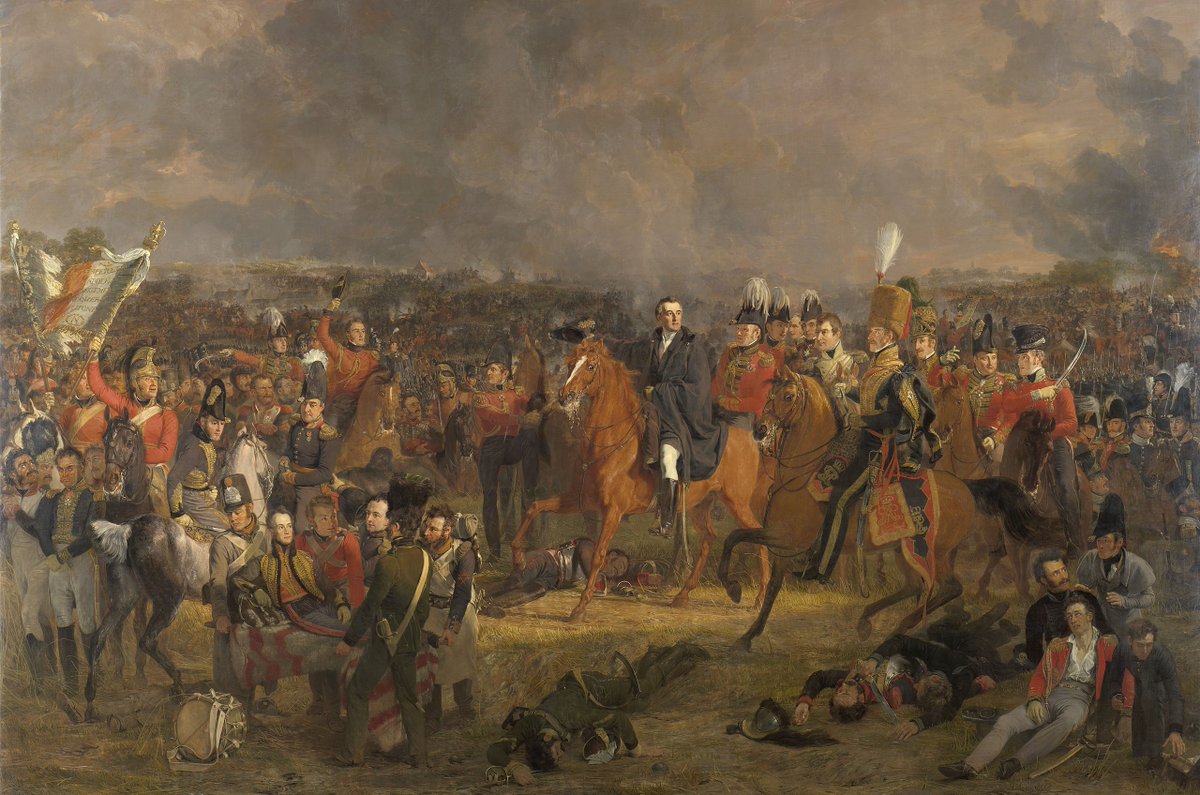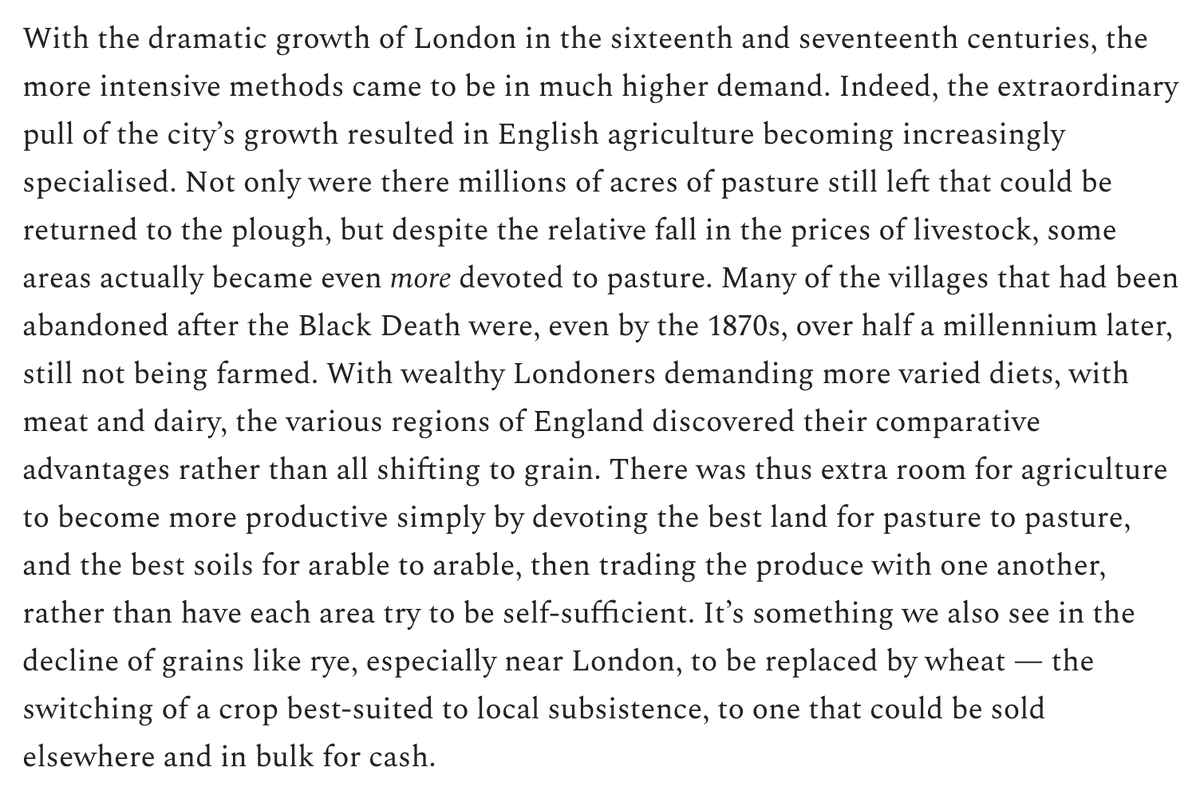
A summary thread and musings on Allen and Wrigley's theory of early pre-industrial urbanization in Britain. 1/ #econhist #EconTwitter #twitterstorians 

Most pre-industrial societies were caught in a devastating low-level equilibrium trap: they had small cities (in absolute and relative terms) and unproductive agriculture (low crop yields and labor efficiency). 2/
To expand the cities and get more labor into industry, farms needed to become more productive—e.g. investment, land use optimization, crop experimentation, etc. for raising yields. 3/
But since the cities were small and market access was limited, European farmers had little incentive to improve. Thus we're stuck in a negative feedback loop: cities can't grow because the farms aren't productive, but farms won't improve because there's no urban demand. 4/
In 1500, two countries (roughly) operated at a high-level equilibrium: Belgium and the Netherlands. Both had urbanization rates close to 30 percent (against 7 percent for Britain), and Belgian agricultural TFP was twice as high as Britain's. 5/ 

By 1800, however, Britain had a lower share in agriculture (35 percent) than either region, and was nearly as urbanized as the Netherlands. Agricultural TFP in Britain was only 20-30% lower than in the Low Countries. 6/ 

What happened? Allen says trade and manufacturing—specifically the woolen manufactures of East Anglia and the London-based export and re-export sector. These industries raised town and urban wages, attracting labor from agriculture. 7/ 

Larger towns and cities increased demand for agricultural products (more people reaching for the same surplus), raising prices. With the terms of trade turning toward agriculture, farmers spent more time in the field and cultivated more intensively. 8/
The three centuries between 1500 and 1800 saw enormous reductions in fallow, increases in labor time in agriculture, and the introduction of new crops (clover, turnips, sainfoin). Fens and marshes were drained and capital investments (land and animals) made. 9/ 

Constant demand for higher-value agricultural goods allowed farmers to specialize (recorded statistically by Broadberry, and argued cogently by @antonhowes) according to the comparative advantages offered by their respective soils, further increasing output. 10/
Farms were engrossed and enclosed and retooled for market production, reorienting themselves for "capitalist" operations and realizing economies of scale. Allen sees this as an eighteenth-century event, but Leigh Shaw-Taylor argues that this had mostly happened by 1700. 11/ 



Inter-regional trade in foodstuffs also led to investment in transport infrastructure, including roads and canals, which needed upgrading and expansion to allow commerce in bulky foodstuffs. This extended production for urban use, integrating national grain markets. 12/
British agricultural TFP, which in 1600 lay between the miserable Spanish and German levels, rose meteorically thereafter, reaching Dutch levels by 1800 as labor productivity, yields, and output per acre all rose. 13/
Thanks to abundant supplies of food, labor, and raw materials, London grew even faster, exceeding 500,000 inhabitants by 1700. A range of smaller industrial and port cities—Norwich, Manchester, Plymouth, and Liverpool—also arose. 14/ 

It's a compelling story, but there are some gaps. Why, for instance, did British farm TFP increase but Flemish TFP fall? In one case, urbanization led to higher TFP; in the other, diminishing marginal returns. It's not clear how to answer this within the model. 15/ 



More broadly: why did Britain experience positive feedback when negative feedback was the rule? Why didn't the Roman Empire of the second century or the Muslim world c. 900—both commercial societies with urbanization and agricultural tech sustain Smithian growth? 16/ 

Can trade explain urbanization? This is the @joefrancis505 question. Relatively small industries create larger backward linkages—shopkeepers, rope-makers, coopers, etc.—and infrastructure that increase urban locational advantages. But internal factors may also have helped. 17/
Further, urbanization-by-trade occurs iteratively and is always the *marginal* advantage that Britain has over the continent. Trade and urbanization are correlated in Britain, Belgium, and the Netherlands. Without trade, Britain grows like Italy and Germany. 18/ 

Where did trade and manufacturing come from? Why did the British not only copy the Netherlands ('mere' catch-up), but actually exceed them in both shipping and woolen production? Colonialism, protection, and naval power may answer that question, but it's still unclear. 19/
And then the million-dollar question: what relevance did any of this have for the Industrial Revolution of 1760-1860? Allen's answer is the high-wage explanation (toward which this is geared), but scholars like @judyzara have more recently shown its empirical faults. 20/ 

There's a case to be made for an IRS industrial agglomeration perspective: concentrating British textiles made it more likely that the critical innovations—flying shuttle, spinning jenny, water frame—would occur there. 21/
One could also argue that urbanization (more purchasers of industrial goods) increased market size, which helped to amortize the fixed costs of R&D. Greater infrastructural infrastructure certainly helped in this regard. Indeed, trade probably increased absolute population. 22/
But Wrigley—also Allen—believes that it all would have been for naught anyway without coal to relieve the land constraint on fuel. Without fossil fuels, Britain would have (even with trade) hit the ceiling already reached in the Low Countries. So did positive feedback matter? 23/ 

In sum: the urban-agricultural feedback loop is a very useful model for thinking about how Britain grew before the Industrial Revolution. It also raises curious questions about the origins of the exogenous factors and its relevance for the IR itself. 24/
If you'd like to read more on this, please do peruse the latest blog/newsletter post: daviskedrosky.substack.com/p/the-endogeno…
#econhist #EconTwitter
#econhist #EconTwitter
Readers may also enjoy the post to which Monday's was the sequel, on the relationship between urban growth and agricultural development. #econhist #EconTwitter #twitterstorian
daviskedrosky.substack.com/p/london-calli…
daviskedrosky.substack.com/p/london-calli…
• • •
Missing some Tweet in this thread? You can try to
force a refresh














